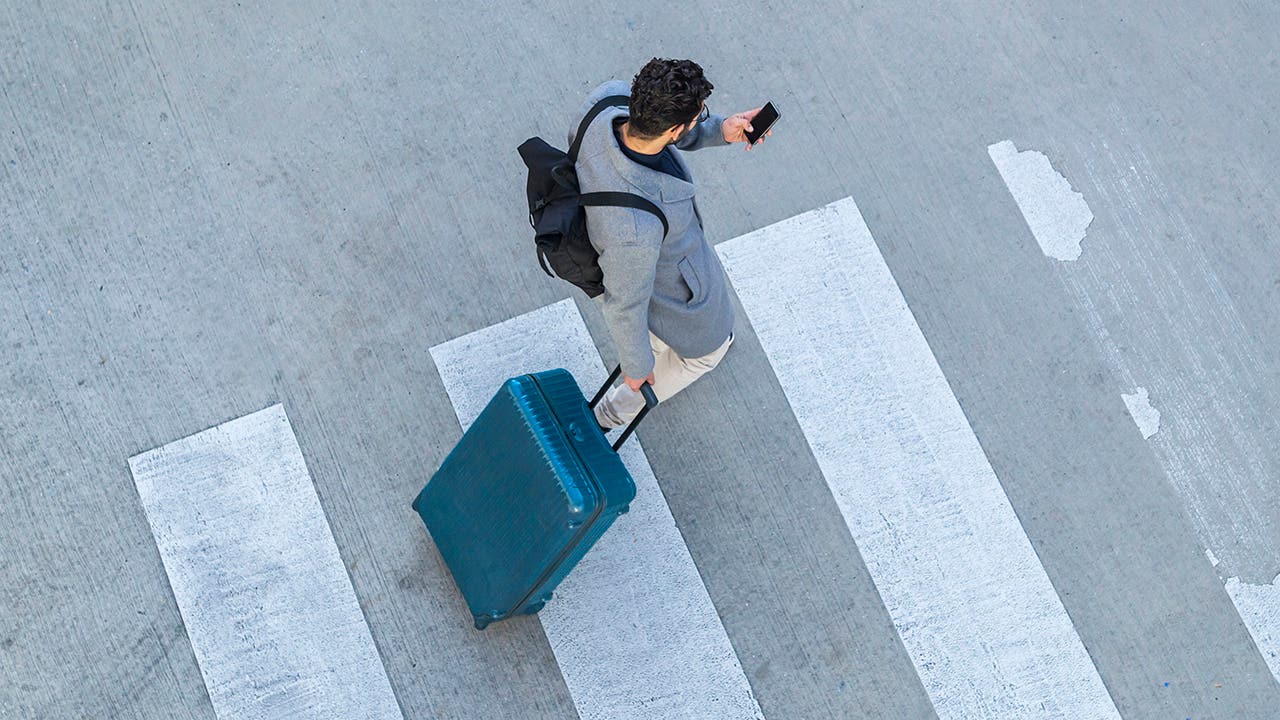How to maximize rewards when traveling for an employer

Key takeaways
- Traveling for work can be a great opportunity to earn rewards on flights, hotel stays, rideshares and other travel-related spending.
- Your company’s policies will determine whether you or the company accrue the rewards earned by your travel spending.
- If your company allows it, you can earn rewards on your travel by adding your personal loyalty membership number to your business travel reservations.
Traveling for work can be fun and exciting, but it can also be exhausting. One perk that can make it worthwhile is the opportunity to rack up your own travel rewards — from both travel providers and credit card issuers — while your employer foots the bill. That said, like so many other aspects of travel, it takes a certain amount of skill and knowledge to earn the most rewards.
How to maximize rewards through work travel
First, it’s important to note that employers aren’t legally obligated to give you the rewards earned from your business travel. While many businesses do so as a courtesy to reflect the toll business travel can take on employees, others accrue rewards within the company to offset future travel expenses. Check your employee handbook or talk to your company’s HR or corporate travel teams for more details on how your company handles travel reimbursements and rewards.
That said, assuming you are able to personally accrue business travel rewards, there are three common scenarios you may encounter:
- You pay for work travel on your personal credit card and request reimbursements for your travel expenses.
- You use a business credit card issued to you to book your business travel.
- Your business travel is booked — either by yourself or a corporate travel team member — through a central portal like SAP Concur, Navan or Egencia.
In the latter two scenarios — where your business travel is booked on a corporate travel rewards card or through a central travel portal — a member of your HR or corporate travel team can help you figure out how to attach your loyalty program number to your reservations, where eligible. But if you’re booking travel on your own and requesting reimbursements, here are some ways to maximize your rewards-earning potential and take advantage of other loyalty benefits while traveling for work.
Earn extra rewards from airline and hotel loyalty programs
Earning rewards for business travel begins with participating in the loyalty programs offered by travel providers such as airlines and hotels. That’s why it’s essential to enroll in the best airline frequent flyer programs and hotel loyalty programs, making sure to add your loyalty account number to every reservation.
In addition to earning points on your regular work flights and stays, these loyalty programs frequently offer promotions that allow you to earn additional rewards for completing certain requirements. For example, you may earn double points for staying at a particular hotel brand, or an airline may offer you extra miles for purchases at select stores and restaurants when you link your loyalty accounts from each. Therefore, it can make sense to opt-in to receiving promotional emails from the loyalty programs you participate in.
Earn and enjoy the benefits of elite status
Once you start participating in these programs, take a little time to learn about their in and outs. For example, most programs offer some form of elite status, allowing you to earn more rewards while enjoying additional benefits. Here are some examples of potential airline and hotel perks you could enjoy with elite status.
Enroll in loyalty programs from other businesses
It also makes sense to look for loyalty programs offered by other companies you use when traveling for business — such as rental car rewards programs, rideshare providers, airport parking companies and even your favorite restaurant chains. Online travel agencies can also offer loyalty programs.
As mentioned previously, linking your everyday loyalty accounts with your personal hotel or airline loyalty accounts may help you earn additional points and miles on your business travel purchases. You may also be entitled to receive discounts at select retailers.
Joining a rental car loyalty program can also be a boon for work travelers. These programs typically offer their frequent customers priority service, vehicle upgrades and credit towards free rentals. Some of them also offer a free day’s car rental when you rent twice within a certain month.
Using personal credit cards for work travel
As with your personal charges, the key to earning the most possible points from your business expenses is to use the right credit cards. This starts with choosing between generic travel rewards cards and co-branded travel cards offered with a partner.
Using generic travel rewards cards
One common type of travel rewards card are those offered by the card issuers that aren’t co-branded with travel providers. For example, cards like the Chase Sapphire Preferred® Card offer 3X points on dining and 2X points on regular travel purchases — including airfare, hotels, rental cars and even parking and tolls. Using your personal card for these business travel expenses can help you build points quickly.
Keep in mind that these points are earned in the Chase Ultimate Rewards program and can be redeemed for travel reservations made with numerous hotels and airlines through their travel portal. Alternatively, these rewards can be transferred to airline miles or hotel points with several different travel partners. Merchandise, gift cards and cash back rewards are also options.
Several card issuers offer similar travel rewards programs that aren’t co-branded with an airline or hotel. Some other programs to consider include:
Using co-branded travel rewards cards
Instead of using a credit card that participates in a bank-sponsored rewards program, you could use credit cards that are co-branded with airlines or hotels. The rewards you earn with these credit cards are in the form of airline miles or hotel points.
These cards typically offer bonuses for purchases from the co-branded airline or hotel, as well as other travel and dining expenses. In addition, these cards will offer perks when traveling. For example, most airline cards offer cardholders a free checked bag, and many offer a faster path to elite status. Some hotel cards come with basic elite status and give you the opportunity to earn more credits towards the next status level.
Using cash back cards
There are some business travelers who would rather earn cash back from their credit cards instead of travel rewards. For example, frequent business travelers might earn enough points and miles directly from their hotel and airline loyalty programs to meet their leisure travel needs. If so, they may prefer to essentially supplement their income through cash back.
The most competitive cash back cards offer a flat rate of 2 percent cash back on all purchases, while others offer big bonuses for purchases such as dining and travel.
How our writers maximize business travel rewards
Ryan Flanigan, a credit cards expert and writer at Bankrate, has spent much of his career traveling for work. To maximize business travel rewards, he believes in starting with frequent flyer or hotel loyalty programs.
If your company is footing the bill for travel, you should always add your frequent flyer number or hotel loyalty number to the reservation. It's basically free points.— Ryan Flanigan, Bankrate credit cards writer
Katie Kelton, a credit cards expert and senior writer at Bankrate, agrees with Ryan and always does this for her business flights.
My strategy is to always book a Southwest flight through Concur and enter my personal Rapid Rewards number. Basically, I want to make sure I cash in on my points even if my employer is paying.— Katie Kelton, Bankrate senior credit cards writer
Flanigan also likes to book using his own cards — equipped with strong travel insurance benefits — and get reimbursed by an employer as opposed to just booking through a corporate travel portal.
If you have the option to pay yourself and get reimbursed, that's even more ideal, since you can use the expenses to earn bonus points or put them towards welcome bonuses. When I travel, I make sure to have a card with solid travel protection, like a Chase Sapphire Reserve® or Preferred card, in case plans change quickly or delays happen. I also make sure I have a card that earns bonuses for food expenses if I know I'm responsible for feeding myself.— Ryan Flanigan, Bankrate credit cards writer
Paying for food expenses in particular can be a great opportunity to earn rewards with your personal card. Nouri Zarrugh, a senior credit cards editor at Bankrate, likes to do this whenever he’s traveling for group outings.
Assuming I can easily get reimbursed, I'll always volunteer to pay for the group. Dinner, rideshares and the like are all fair game. When I flew in for a visit to my company headquarters for meetings a few years back, I put my team's dinner bill on my Capital One Venture X Rewards Credit Card. This made it much easier to earn the sign-up bonus, and I simply requested reimbursement from the company once I got home. It was a nearly $700 bill, so it gave me a big leg up, and I also earned a few points just from the charge itself.— Nouri Zarrugh, Bankrate senior credit cards editor
Should you book work travel on a personal credit card?
The most important advantage of using your personal credit card to pay for business travel is that you can accrue more credit card rewards. However, doing so means you’ll need to spend time completing expense reports, and it may take a few weeks to receive a reimbursement check from your employer. If you carry these charges as a balance, you may incur additional interest charges from your company expenses that won’t be reimbursed by your employer.
Booking with your business card or through your company’s travel portal lets you avoid these hassles, if you’re given the option to do so. Keep in mind that most airlines will still allow you to apply your frequent flyer number to reservations booked through a travel agency. However, many hotels only offer benefits and rewards in their loyalty program when you book your room directly through the hotel chain.
So although booking your business travel through an employer’s travel agency can mean easier expense reporting and less risk, you’ll also miss out on rewards you could have earned by charging the travel to your personal credit card. When you have the option, charging your business travel to your personal credit card is the usually best way to maximize the rewards you’ll earn.
The bottom line
Between the points and miles offered by credit card issuers and those offered by travel providers, there are multiple ways to maximize the rewards you earn from your business travel. By understanding all of the ways that you can earn points, miles or cash back, you’ll be able to earn the most valuable rewards whenever you’re asked to travel for your company.
Why we ask for feedback Your feedback helps us improve our content and services. It takes less than a minute to complete.
Your responses are anonymous and will only be used for improving our website.






